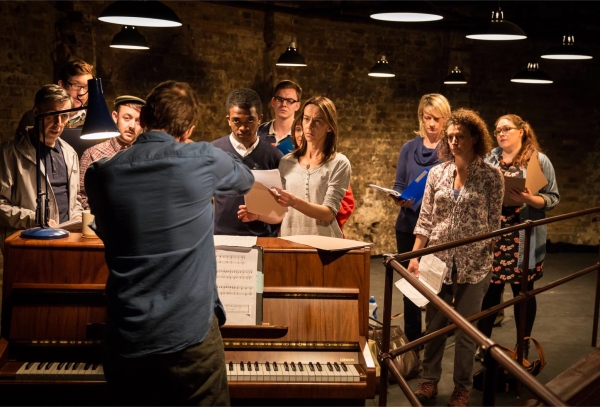Our Town (Almeida Theatre)

© Marc Brenner
It’s said that Our Town, the American classic written by Thorton Wilder in 1938, is performed somewhere around the world every day of the year. If true, this seems brilliantly apt for a play that is about the daily, unexceptional experience of living. Absorbing and slowly, sneakily affecting, Our Town is about the big and the small, encompassing all of life and death in its simple tale of small New Hampshire town Grover’s Corners.
Director David Cromer‘s version, first seen in the States, delicately retunes Wilder’s play for a 21st-century audience, amplifying its essential ordinariness. Everything about this town is calculatedly unremarkable. We could be anywhere. I say we, because the audience too are transported to Grover’s Corners – seated on Main Street, perhaps, or peering into the window of one of the houses. The house lights remain up throughout and the performers move among the stalls, creating an intimate and conspicuously artificial experience. At the same time as immersing us in small town life, there’s no forgetting that we’re in a theatre.
In stretching the existing meta-theatricality of Wilder’s play, Cromer and his cast also eschew any attempt at an accurate regional accent, instead speaking with their own varied hodgepodge of inflections. In this, and in their modern, commonplace clothing, they are closer to the audience than ever, intensifying the continued resonance of this story of early-twentieth-century life. We still live, we still love, we still die.
This familiar cycle of life and death forms the structure for Wilder’s play. In three acts, we see the full spectrum of life in Grover’s Corners, from the birth of two new residents, to the ritual of marriage, to the final destination of the town graveyard. Despite being discussed as a radical "rethinking" of the play, Cromer’s version is for the most part brilliantly unshowy, peeling away the gloss of nostalgia to get at the profound and poignant truths beneath. Orchestrating proceedings onstage as well as off in the role of the Stage Manager, Cromer is wry and briskly business-like, with little time for warmth or comfort.
But while the cosiness that is sometimes associated with Our Town might be absent, the humanity is there in buckets. This is partly thanks to the simplicity of the staging, which puts people firmly at its centre, and partly testament to the performances. Particularly impressive are Anna Francolini as weary yet patient doctor’s wife Mrs Gibbs and a devastating Laura Elsworthy as dramatic linchpin Emily, who in this imagining feels each of life’s little sorrows and ecstasies with quiet intensity.
When in the final act Emily is offered a glimpse of the life she has left behind, a stunning detour from the established staging further compounds the painful beauty of everyday existence. Almost paradoxically, it is the production’s single gasp-inducing flight from the ordinary, heightening the exquisite, agonising joy of simply living. And as we glance wet-eyed across at one another, in full view under the Almeida’s house lights, Cromer seems to be asking us to look better at the people right in front of us.
Our Town runs at the Almeida until 29 November










